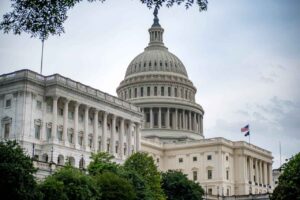The senior Republican on the powerful House Ways and Means Committee Kevin Brady (R-TX) delivered the following remarks at a Full Committee Hearing on Understanding the Tax Gap and Taxpayer Noncompliance.
WATCH THE HEARING IN ITS ENTIRETY
Remarks as prepared for delivery:
“Thank you, Chairman Neal.
“The tax gap is an important issue, and Republicans on this Committee support closing the tax gap.
“The tax gap — or, the difference between tax amounts that taxpayers should pay versus what they actually pay — has been a persistent problem for decades.
“The IRS periodically estimates the tax gap using audit and other data it collects, and as of April 2016, the agency estimated that the gap was approximately $458 billion in unpaid taxes per year between 2008 and 2010.
“This is clearly a problem.
“Republicans support closing the tax gap with better customer service, smarter audits, improved IRS assessment of the gap, and capitalizing on our simpler, improved tax code.
“For starters, we need to make sure that taxpayers are provided the customer service they deserve.
“Most Americans want to pay the taxes they owe but have a hard time when questions arise and they can’t get through to the IRS to get help.
“We need to make it easier, which is why we required the IRS to create a customer service strategy in the bipartisan Taxpayer First Act.
“Additionally, the IRS needs to better utilize the vast amount of information it collects to estimate the tax gap.
“And in doing so, it is paramount that taxpayer rights – and taxpayer privacy – are protected.
“The way that the IRS currently estimates the tax gap comes at a huge personal cost to taxpayers: requiring significant time, in-person meetings, and tons of prep work.
“If the IRS is going to put taxpayers through that experience, it should outline a strategy on how it plans to use the information, in a timely manner, to close the tax gap.
“Additionally, we know that in order to address this gap, we must address our changing economy.
“‘Gig’ economy workers – such as folks who drive for Uber or use their home as an Airbnb – contribute greatly to our economy.
“We support innovation in our workforce and want to ensure these companies can succeed.
“But as TIGTA, who we will hear from today, recently discovered, there is greater risk of folks who participate in the gig economy of noncompliance.
“TIGTA recommended to the IRS that the agency develops a strategic plan to address tax administration in the gig economy – and the IRS agreed on its importance.
“We believe that Congress must be involved in these discussions, as well. Helping workers comply with the tax code is needed to reduce this gap.
“I know many of the other side of the dais today will cry foul and claim that Republicans have ‘gutted’ the IRS over the years.
“The truth is that the IRS budget has been stable over the last several years and any cuts by Congress were made only when compared to an all-time budget high. Republicans are committed to ensuring that our nation’s tax administrator does the job it’s built to do: administer our tax code.
“Because especially as it concerns closing the tax gap, the solution must be myriad.
“There is no one single approach that will fully and cost-effectively address the tax gap. The IRS cannot audit its way out of the tax gap. Solving the tax gap requires multiple solutions across different types of taxes.
“And as TIGTA has found, the IRS can be using its current resources more effectively.
“There are opportunities that exist to help the IRS complete smarter audits; and GAO has recommended ways in which the IRS could allocate enforcement resources to maximize its audit results.
“Before we discuss funding, let’s take a look at the IRS’s current standing. The agency needs to show us that it is capable of effectively managing its existing funds.
“The points we address today are simply a start.
“Let’s work together to close this gap while protecting taxpayers, further simplifying our tax code, and improving customer service at the IRS.
“Thank you, Chairman Neal. I yield.”




